
Top 10 Most Controversial Decisions Ever in a World Cup
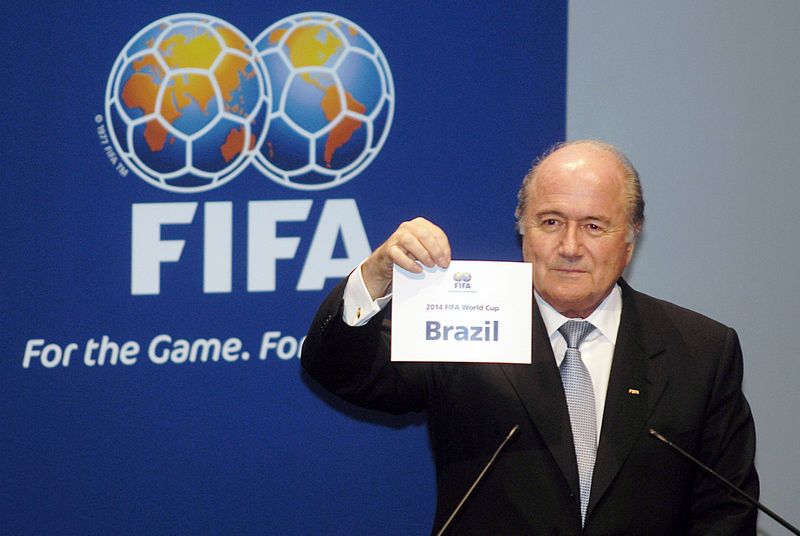
The FIFA World Cup, one of the biggest sporting events on the planet, has seen its fair share of controversial decisions that left fans, players, and pundits alike in a state of disbelief. From referees' errors to questionable calls, these moments have etched themselves into the history of the tournament. Join us as we delve into the top 10 most controversial refereeing decisions in World Cup history.
Number 10: Japan vs. Spain - 2022 World Cup

The 2022 World Cup in Qatar witnessed its own set of peculiar events. In a group stage match between Japan and Spain, a contentious decision took center stage. After a rollercoaster of results in the group, Germany's hopes hinged on Spain defeating Japan while they aimed for victory against Costa Rica. Japan secured a 2-1 victory over Germany, with their winning goal surrounded by controversy. Kaoru Mitoma's cross, converted into a goal by Ao Tanaka, was initially nullified by the referee for going out of play. However, after a VAR review, the goal was deemed legitimate due to the curvature of the ball still being within the lines. FIFA's post-match footage tried to justify the decision, but many fans remained unconvinced, questioning the fairness of modern football.
Number 9: France vs Argentina Premature Final Whistle - 1930
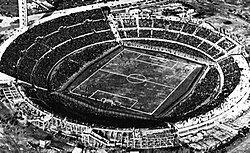
Controversial decisions in the World Cup have a long history, and the precedent was set in the very first tournament held in 1930. France found themselves on the wrong end of a highly disputable call in their group-stage match against Argentina. With Argentina leading 1-0, the referee, Antonio Rego, inexplicably blew the final whistle six minutes before the normal time, denying France a potential opportunity to equalize. The French team was left enraged, but despite the referee's realization of his error and resumption of play, the damage had already been done. France succumbed to a defeat, failing to advance to the knockout stages.
Number 8: Two Offside Goals Given - USSR vs. Belgium - 1986

The 1986 World Cup witnessed an incident that still haunts the memories of many football fans. The Soviet Union faced Belgium in a round of 16 match, and despite a thrilling encounter, controversy tainted the outcome. The USSR lost 4-3 to Belgium in extra time, but it was marred by two offside goals that went in favor of the Belgians. Replays of the game clearly showed the sense of injustice felt by the USSR team, as they were denied a fair chance to progress in the tournament.
Number 7: Josep Simunic's Three Yellow Cards - Croatia vs. Australia - 2006
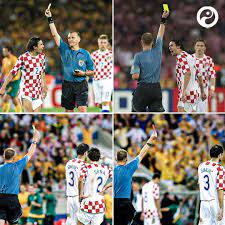
Referee blunders can sometimes defy belief, and the 2006 World Cup witnessed one of the most bizarre errors ever committed. In a group stage match between Croatia and Australia, Josep Simunic received not one, not two, but three yellow cards from referee Graham Poll. Simunic escaped an early red card despite receiving his second yellow in the 87th minute. Astonishingly, in the 90th minute, Simunic committed another foul, earning him his third yellow, which eventually led to his sending off. The embarrassed referee, Graham Poll, decided to retire from his officiating career after realizing his incredible oversight.
Number 6: Lampard's Ghost Goal - England vs. Germany - 2010
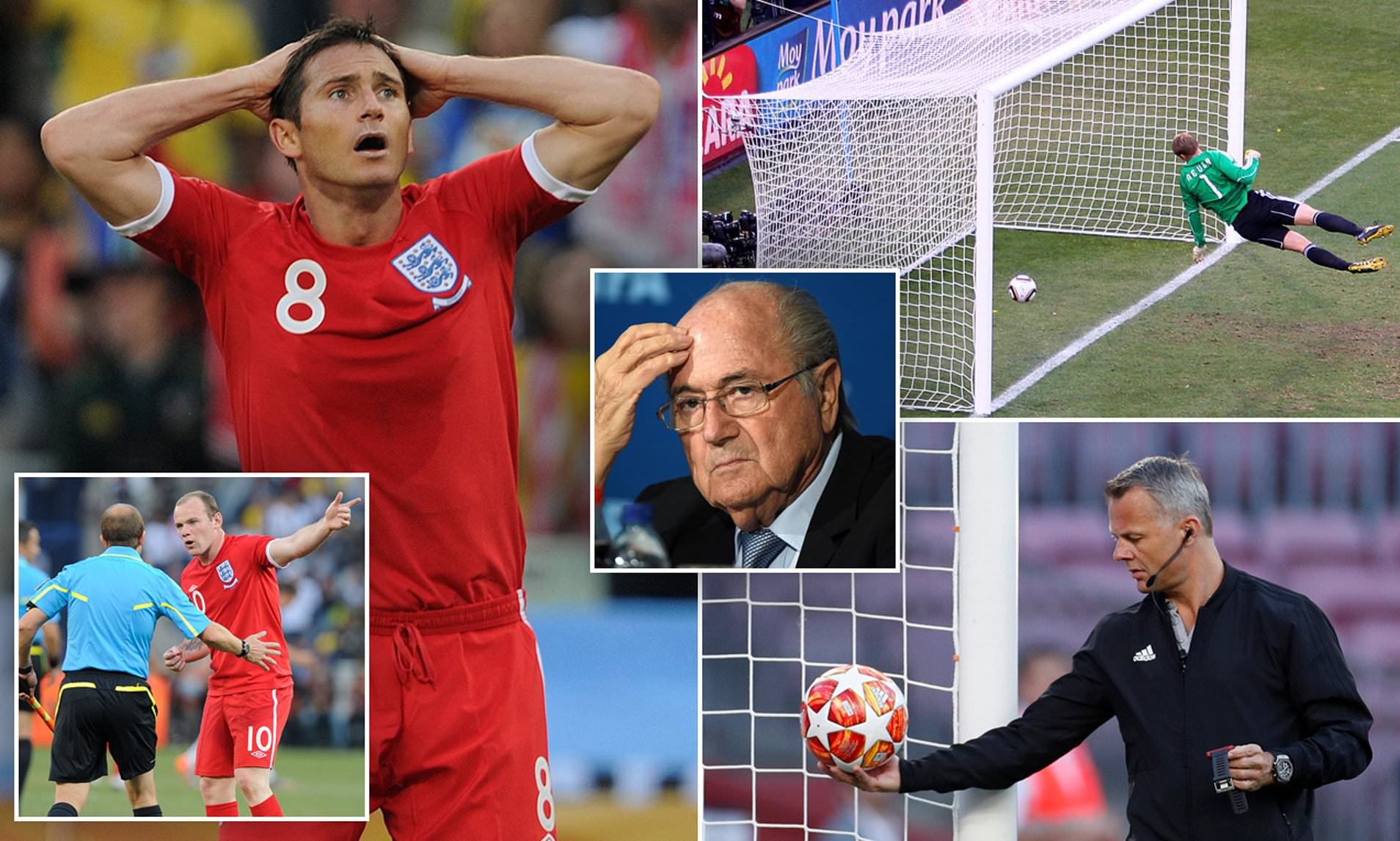
The controversy surrounding Frank Lampard's disallowed goal in the 2010 World Cup match between England and Germany led to a watershed moment for the introduction of goal-line technology. With England trailing 2-1, Lampard unleashed a powerful shot that struck the underside of the crossbar and clearly crossed the goal line before bouncing back into play. However, the referee and assistant referee failed to award the goal, deeming it a non-goal. This decision sparked widespread outrage as replays showed the ball crossing the line by a significant margin. FIFA's failure to embrace technology at the time intensified calls for goal-line technology implementation, which eventually became a reality in subsequent tournaments.
Number 5: Rudi Voller's Dive: West Germany vs. Argentina 1990
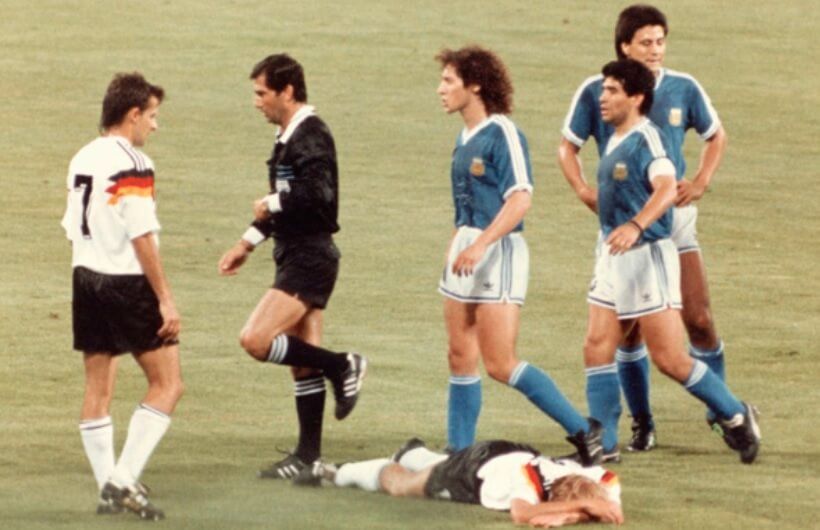
8 July 1990, it was a world cup final rematch between Argentina and West Germany. Four years back in 1986, Argentina defeated Germany in the world cup final 3-2 to win their second world cup. So, in 1990 they were on a mission to repeat the event but Germany were ready to also revenge for the pain the loss caused them four years earlier. As expected, it was a tight game, held at 0-0, and was about progressing into the extra time before West Germany scored a controversial winning goal. Germany’s Rudi Voller dived in the 85th minute but rather than being penalized for diving, referee Edgardo Codesal decided it was a penalty. Andreas Brehme scored the penalty and secured West Germany’s third world cup win. In that game, Argentina became both the first team to fail to score in a World Cup final, and the first defending champion to reach the final and lose. Also, West Germany's victory over Argentina marked the first time a UEFA side defeated a CONMEBOL side in a world cup final, all previous meetings had been won by South American sides.
Number 4: Schumacher 'Foul' on Battiston: France vs. West Germany 1982

In another dramatic 1982 world cup semi-final tie between France and West Germany, everything went bad for the French team. They didn’t just lose the semi-final game they also lost a man.
With the game tied at 1-1 and both teams eyeing the final, Patrick Battiston was through on goal with a potential scoring opportunity. As he raced one-on-one with the goalkeeper, he flicked the ball over him beautifully but the German goalkeeper refused to be outsmarted and collapsed with Battiston who went down lying lifeless on the turf. It was so bad that he had to receive oxygen and the game was paused as the medical team gave him other special attention. The foul had sent him into a coma and damaged his vertebrae while also losing three teeth. The controversial side is that all these happened yet the offender, Harald Schmazer was left on the field neither did referee Charles Corver award a penalty kick to France. Probably still not being able to quickly recover from the loss of their player, France went on to lose on penalties to West Germany. After the incident, Battiston said he could forgive Schmazer but couldn’t remain the same player after the incident. Platini, while commenting after the game said, he thought Battiston had died. So, it’s totally shocking how a foul that could have taken a life went unnoticed.
Number 3: Co-Host Conspiracy: South Korea 2002

Qatar became the first world cup host to lose their three opening games. They surely didn’t follow the steps of South Korea in 2002, a co-host believed to have been sponsored into the semi-final of the world cup with many controversial decisions by game officials. Such conspiracy theories are not new to the world cup anyways. Italy in 1934, England in 1966, and Argentina in 1978 received notorious accusations of having been controversially aided in their world cup run. 2002 was the first time that Asia would be hosting the world cup and the conspiracy was at work again. Many believed that co-host South Korea were given some undue favor in their progression to the semi-final. Their knockout games against Italy and Spain were arguably the most scandalous in the history of the world cup. It was so much that the then-FIFA president conceded to the fact that some of the officiating at those games had been riddled with corruption. In their round of 16 game against Italy, Ecuadorian referee Byron Moreno was set to ruin Italian football, he practically overlooked some deadly tackles from the South Koreans and selectively punished tackles made by Italians. When it looked like it wasn’t enough he crowned it by disallowing a legitimate goal and sent off Italy’s long-serving striker, Francesco Totti for diving when replays showed that he clearly lost his footing. The same followed in the Quarter Final against Spain. The referee supported South Korea for more than 120 minutes as Spain were denied two legitimate goals which left many remembering the 2002 world cup as one of the most corrupt world cup editions. Their run came to an end after they were evicted by Germany in the Semi-final and also beaten by Turkey in the third place showing that they couldn’t win a game without being aided.
Number 2: Diego Maradona’s Hand of God Goal: Argentina vs. England 1986

The three lions of England have experienced quite a number of heartbreaks in the world cup, one of which is the cheeky goal against Argentina in 1986, modeled as “the hand of God”
For Maradona, that world cup quarter final game had a bit of everything he’s known for - a football genius with a spice of some rascal instinct. In the match where he picked the ball from half field and dribbled past everyone with 11 touches in 11 seconds to score the goal of the century, he equally scored a controversial goal that he tagged “the hand of God” With Maradona standing in an offside position, he was rightly positioned to receive a ball that looped behind Steve Hodge who was trying to make a clearance. And knowing that he had no chance against the goalkeeper who was obviously taller than him, he helped himself with his hand to put the ball past the goalkeeper. He raced away in celebration with no sign of suspicion to have revealed that he scored with his hands. The English team then raced towards the referee, complaining that it was a handball, but he gave no heed and the goal stood meaning that a combination of one controversial goal and one adorable goal from Maradona sent England out of the 1986 world cup. What a genius!
Number 1: Geoff Hurst’s Phantom Goal: England vs. West Germany 1966
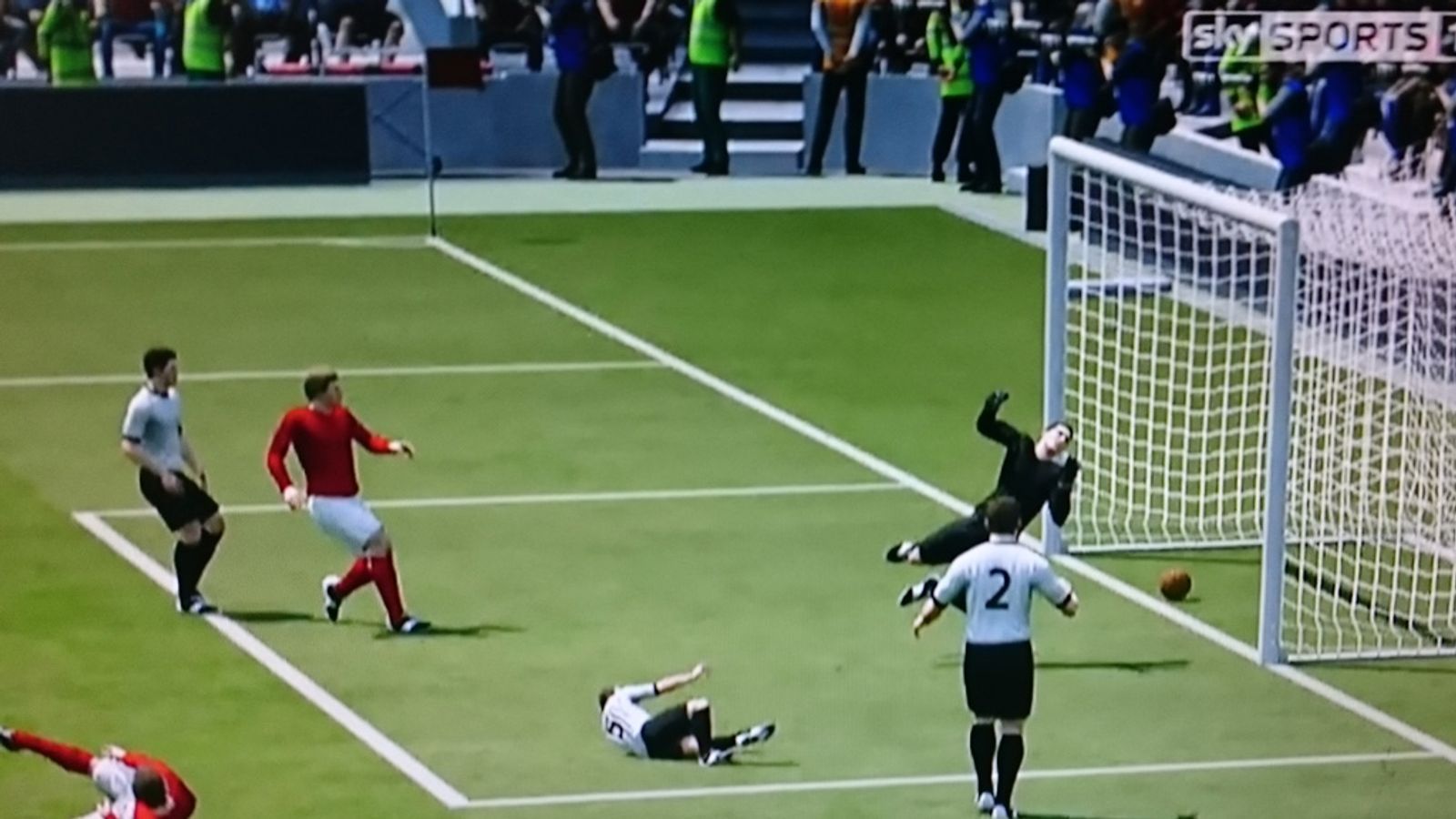
England were mostly at the receiving end of controversial decisions, but this time, it worked in their favor. Their first and only world cup win was not without a controversial goal. England had their own piece of luck against West Germany in 1966 and good for them that it was in the final. The game was held at 2-2 after 100 minutes played. At the extra time, Geoff Hurst hit a jackpot with his shot hitting the crossbar before bouncing down into the goal line and out. Initially, that goal was not going to stand but deliberations between referee Gottfried Dienst and linesman Tofiq Bahramov led to the goal being awarded and England went 3 - 2 up before eventually adding a fourth goal to lift the Jules Rimet trophy at Wembley Stadium. Owing that there was no advanced goal-line technology to have decided whether the ball had crossed the line but relying on the camera angles and a bit of replay showed that the ball could be estimated to have crossed 97%, meaning it should not have stood. But had that goal not stood, England would have been without a world cup till date!
Which of these decisions would you choose as the most controversial, or we probably miss anyone? Let us know in the comment section.
Read more on how I unravelled Ronaldo's footballing prowess.
Appreciate the creator